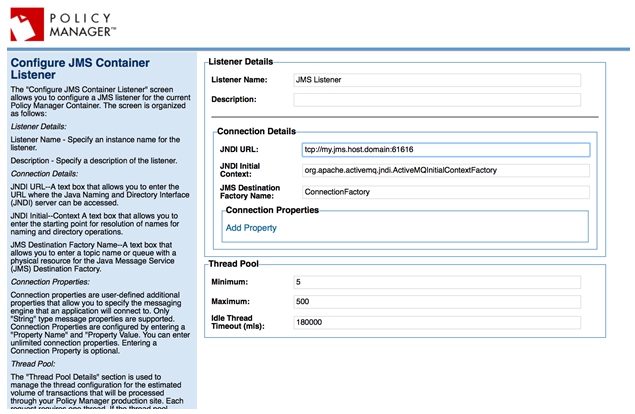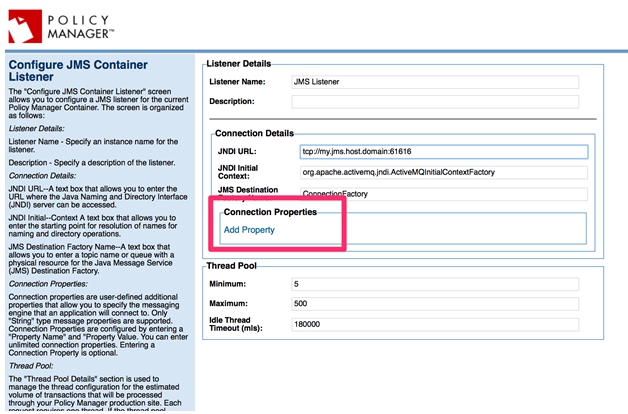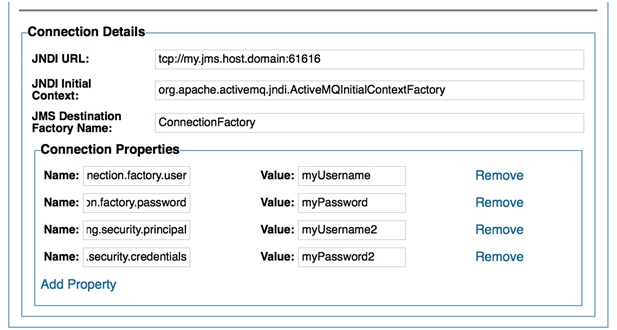JMS Connection Properties
Learn how to configure JMS connection properties.
On this page:
- Adding/Modifying JMS Connection Properties
- Using the Add Property Link
- JMS URL Parameters
- JMS Connection Properties
Adding/Modifying JMS Connection Properties
When adding or modifying a JMS connection to Policy Manager, three properties can be configured directly.

- JNDI URL
- Example 1 (Active MQ): tcp://my.jms.host.domain:61616
- JNDI Initial Context
- Example 1 (ActiveMQ): org.apache.activemq.jndi.ActiveMQInitialContextFactory
- JMS Factory
- Example 1 (ActiveMQ): ConnectionFactory
Using the Add Property Link
Additionally more properties can be configured by clicking the Add Property link in the connection details.

JMS URL Parameters
| Parameter | Description |
|---|---|
| destination | The URL parameter name used to identify the JMS destination (topic or queue) name. |
| connectionFactory | The URL parameter name used to specify the JMS factory name |
| jndiProviderURL | The URL parameter name used to define the JNDI provider URL. |
| initialContextFactory | The URL parameter name used to define the JNDI initial contextfactory class. |
| format | The URL parameter name used to identify the message type. Acceptable values are text or bytes. |
| temporaries | The URL parameter name used to allow or disallow the use of temporary destinations. The acceptable values are true or false. |
| replyto | The URL parameter name used to identify the replyTo destination. |
JMS Connection Properties
| Property | Description |
|---|---|
| jms.mode | Identifies the JMS mode. The value must be one of JMS_QUEUE_MODE or JMS_TOPIC_MODE. |
| jms.transactional | Indicates the JMS transport's transactional behavior. The value is Boolean, indicating that the transport should use transaction (true) or the transport should not use transaction (false). If not set, defaults to false. |
| jms.use.temporaries | Indicates whether the JMS transport should use temporary destinations in the JMSReplyTo property of outgoing messages. The value is Boolean, with a value of true if temporaries should be used. |
| jms.message.type | Indicates the JMS message type to use. The value will be either JMS_MESSAGE_TYPE_BYTES or JMS_MESSAGE_TYPE_TEXT. |
| jms.read.timeout | The JMS read timeout. The value is the string value of the number of milliseconds. |
| jms.selector | The default message selector expression. |
| java.naming.security.principal | The JNDI provider username used with the JMS transport. |
| java.naming.security.credentials | The JNDI provider credentials used with the JMS transport. |
| java.naming.security.authentication | The environment property for specifying the security level to use (constant). Its value is one of the following strings: none, simple, or strong. If this property is unspecified, the behavior is determined by the service provider. |
| jms.connection.factory.user | The JMS connection factory username. |
| jms.connection.factory.password | The JMS connection factory password. |
| jms.connection.factory.name | The JMS connection factory name. |
| jms.destination.name | The JMS destination name. |
| jms.replyto.name | The JMS replyTo destination name. |
| jms.durable.subscriber | The JMS durable subscriber name. |
| jms.persistent.delivery | Indicates whether or not to use PERSISTENT delivery mode. |
| jms.time.to.live | The JMS message time to live value. The value will be a string version of the number of milliseconds. |
| jms.priority | The JMS priority. |
| jms.retries | The JMS retry count. |
| jms.client.id | The JMS client ID for durable subscriptions. |
| jms.url | The JMS URL string. |
| jms.protocol | The JMS protocol. This is usually jms, but could be amqp or amqps. |
| amqp.virtual.host | The virtual host for AMQP/S. |
| amqp.port | The port for AMQP/S. |
